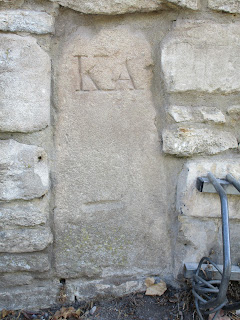Sunday 14th July
2019
We went for a walk around Avoncliffe before a slow cruise covering the
1½
miles back into Bradford and were, yet again, lucky enough to find a place on
the 48 hour moorings. Avoncliffe is a tiny, delightful place and a very popular
stop for walkers and cyclists. Around the Cross Guns pub are a few cottages, all
staggered towards the river bank and dominated by the Aqueduct. However, looking
at signs from the past, it had once been a thriving small-scale industrial centre
with water mills and factory mills concerned with the cloth industry. The
up-market Avoncliffe Villa apartments bely their past as, first the Bradford
Workhouse, then a convalescence hospital for injured First World War troops and
later a hotel.
Right our Bradford moorings, down a small embankment, is Barton Farm.
The farm buildings are all Medieval and consist of a Manor House, a Granary,
one of the best examples of a Tithe Barn and several other buildings. Today, the
Tithe Barn is open for visitors, the Manor House is a private residence and the
other buildings used for businesses, but remarkably, the whole site was a working
farm until 1972.
Barton Farm
From the canalside, the town of Bradford seems almost like a fortified
Medieval French hillside town, with its soft Bath stone and buildings scattered
up the side of a steep hill. Certainly the place has a quaint feel to it with
lots of small, twisting lanes and narrow alleyways all leading off the main
road and passing steeply up the hill.
The Town Bridge is one of the few Medieval pack horse bridges in
Britain to have a surviving chapel on it, which was later used as the town
lock-up. There a quite a number of old mill factories, all of which would have
been associated with the cloth industry and merchants’ houses.
The Church of St. Laurence is largely untouched. This tiny church is
Saxon in original dating from about 1001 but could have built as early as AD
709. Its original purpose was only discovered in the 1857 previous to which it
had been used as a Slaughter House and as Cottages. Its interior is plain and
simple but nonetheless, stunning for this.
Saxon Church of St. Laurence
Weather: hot
Day Total: 0 locks; 1 mile; 0 Tunnels; 0 Swing Bridges; 0 Lift
Bridges; 0 Boat Lift; engine running hours 0.8
Overall Total: 560 locks; 1078 miles; 48 tunnels; 38 Swing Bridges; 5
Lift Bridges; 2 Boat Lifts; engine running hours 673.6hrs








Beautiful little place!
ReplyDelete